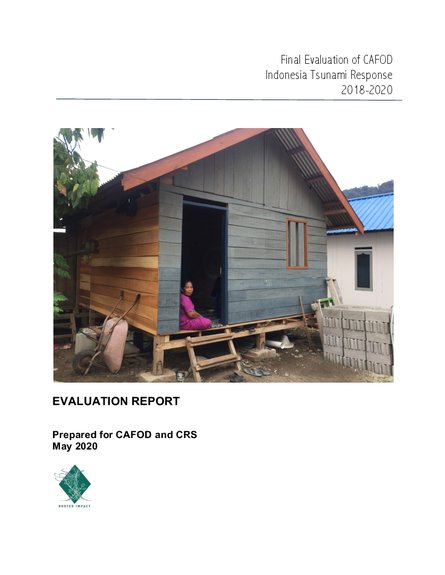
Executive Summary
Background
In the aftermath of the earthquake, tsunami, and liquefaction disaster that struck Central Sulawesi, Indonesia on 28 September 2018, CAFOD mobilized a strong network of partners across the Caritas network, including Catholic Relief Services (CRS), Caritas Switzerland, and Caritas Indonesia, also known as KARINA, to respond to the needs of disaster affected populations.
Supported by emergency funding appeals from the Disasters Emergencies Committee (DEC) CAFOD’s Appeal and other donations, the CAFOD Central Sulawesi Earthquake and Tsunami Response was a cooperative effort to meet the relief and recovery needs of disaster affected populations utilizing the complementary strengths brought by the greater Caritas network.
The CAFOD appeal funded partnerships with KARINA and Caritas Switzerland commenced in October 2018 and are currently ongoing until 2021.
CAFOD’s DEC programme, led by CRS, focused on a market-based approach (cash transfer) to build transitional shelter and sanitation, protection and disaster risk reduction. The DEC response was initiated in October 2018 and will come to an end in May 2020, implemented over two phases.
About the Evaluation
The DEC provided financial support for CAFOD to commission an external evaluation of its overall Indonesia Tsunami Response in Central Sulawesi. The evaluation commenced in March 2020 and was completed in May 2020.
The aim of this evaluation was to reflect on a combination of partnership approaches, programme delivery mechanisms and quality of services, and accountability and protection, derived from its joint disaster response in the target programme areas.
This report presents emerging evaluative findings and actionable recommendations to support accountability of CAFOD and its partners and improve future emergency responses taken in the wake of disasters in Indonesia and globally.
Despite the challenges imposed by the current global pandemic of COVID-19, the evaluation was completed in a timely manner, adapting its methodology to meet the constraints of the operating environment and prioritize the well-being of staff and local communities.
The evaluation engaged with staff of CAFOD, CRS, MDMC, PKPU-HI, Yayasan Pusaka Indonesia, Caritas Switzerland, KARINA, peer humanitarian agencies, and district government in consultations. COVID-19 prohibited international travel and convening groups for consultation, which resulted in the evaluation team being unable to engage with community level stakeholders and beneficiaries at this time.
The frameworks supported by CAFOD and its partners prioritized international humanitarian norms including the Inter-Agency Standing Committee (IASC) Commitments on Accountability to Affected Populations and Protection from Sexual Exploitation and Abuse (PSEA), the Core Humanitarian Standards on Quality and Accountability (CHS), Sphere standards, and the global commitments to localization.